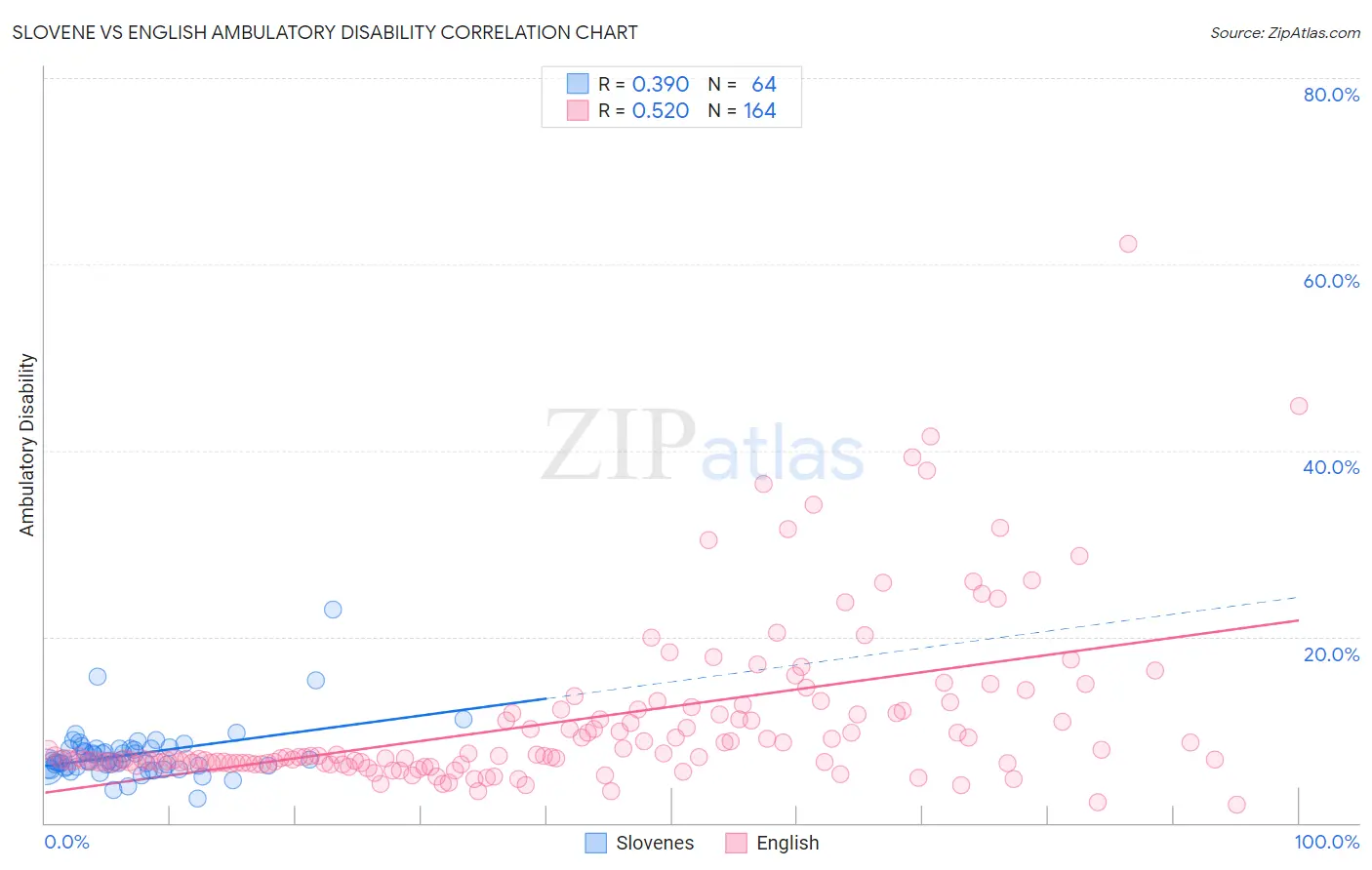Slovene vs English Ambulatory Disability
COMPARE
Slovene
English
Ambulatory Disability
Ambulatory Disability Comparison
Slovenes
English
6.2%
AMBULATORY DISABILITY
18.0/ 100
METRIC RATING
205th/ 347
METRIC RANK
6.6%
AMBULATORY DISABILITY
0.4/ 100
METRIC RATING
262nd/ 347
METRIC RANK
Slovene vs English Ambulatory Disability Correlation Chart
The statistical analysis conducted on geographies consisting of 261,334,117 people shows a mild positive correlation between the proportion of Slovenes and percentage of population with ambulatory disability in the United States with a correlation coefficient (R) of 0.390 and weighted average of 6.2%. Similarly, the statistical analysis conducted on geographies consisting of 579,179,335 people shows a substantial positive correlation between the proportion of English and percentage of population with ambulatory disability in the United States with a correlation coefficient (R) of 0.520 and weighted average of 6.6%, a difference of 5.3%.

Ambulatory Disability Correlation Summary
| Measurement | Slovene | English |
| Minimum | 2.6% | 2.0% |
| Maximum | 23.0% | 62.2% |
| Range | 20.4% | 60.2% |
| Mean | 7.3% | 11.0% |
| Median | 6.7% | 7.1% |
| Interquartile 25% (IQ1) | 6.0% | 6.4% |
| Interquartile 75% (IQ3) | 8.0% | 11.9% |
| Interquartile Range (IQR) | 2.0% | 5.5% |
| Standard Deviation (Sample) | 2.9% | 9.0% |
| Standard Deviation (Population) | 2.9% | 8.9% |
Similar Demographics by Ambulatory Disability
Demographics Similar to Slovenes by Ambulatory Disability
In terms of ambulatory disability, the demographic groups most similar to Slovenes are Immigrants from Congo (6.2%, a difference of 0.020%), Immigrants from Ukraine (6.2%, a difference of 0.030%), Finnish (6.2%, a difference of 0.070%), Albanian (6.2%, a difference of 0.15%), and Immigrants from Central America (6.2%, a difference of 0.17%).
| Demographics | Rating | Rank | Ambulatory Disability |
| Immigrants | Bangladesh | 24.6 /100 | #198 | Fair 6.2% |
| Italians | 22.6 /100 | #199 | Fair 6.2% |
| Immigrants | Cambodia | 21.5 /100 | #200 | Fair 6.2% |
| Immigrants | Central America | 20.1 /100 | #201 | Fair 6.2% |
| Albanians | 19.7 /100 | #202 | Poor 6.2% |
| Immigrants | Ukraine | 18.4 /100 | #203 | Poor 6.2% |
| Immigrants | Congo | 18.2 /100 | #204 | Poor 6.2% |
| Slovenes | 18.0 /100 | #205 | Poor 6.2% |
| Finns | 17.2 /100 | #206 | Poor 6.2% |
| Alsatians | 15.1 /100 | #207 | Poor 6.3% |
| Bangladeshis | 14.2 /100 | #208 | Poor 6.3% |
| Immigrants | Iraq | 14.0 /100 | #209 | Poor 6.3% |
| Immigrants | Laos | 13.2 /100 | #210 | Poor 6.3% |
| Samoans | 12.1 /100 | #211 | Poor 6.3% |
| Mexican American Indians | 12.0 /100 | #212 | Poor 6.3% |
Demographics Similar to English by Ambulatory Disability
In terms of ambulatory disability, the demographic groups most similar to English are Hmong (6.6%, a difference of 0.12%), Irish (6.6%, a difference of 0.17%), Immigrants from Belize (6.6%, a difference of 0.24%), Aleut (6.6%, a difference of 0.25%), and Spanish American Indian (6.5%, a difference of 0.43%).
| Demographics | Rating | Rank | Ambulatory Disability |
| Welsh | 0.6 /100 | #255 | Tragic 6.5% |
| Immigrants | Uzbekistan | 0.6 /100 | #256 | Tragic 6.5% |
| Bermudans | 0.5 /100 | #257 | Tragic 6.5% |
| Spanish American Indians | 0.5 /100 | #258 | Tragic 6.5% |
| Aleuts | 0.4 /100 | #259 | Tragic 6.6% |
| Immigrants | Belize | 0.4 /100 | #260 | Tragic 6.6% |
| Irish | 0.4 /100 | #261 | Tragic 6.6% |
| English | 0.4 /100 | #262 | Tragic 6.6% |
| Hmong | 0.3 /100 | #263 | Tragic 6.6% |
| Nepalese | 0.2 /100 | #264 | Tragic 6.6% |
| Bahamians | 0.2 /100 | #265 | Tragic 6.6% |
| Guyanese | 0.2 /100 | #266 | Tragic 6.6% |
| Trinidadians and Tobagonians | 0.2 /100 | #267 | Tragic 6.6% |
| Spanish | 0.2 /100 | #268 | Tragic 6.6% |
| French | 0.1 /100 | #269 | Tragic 6.6% |